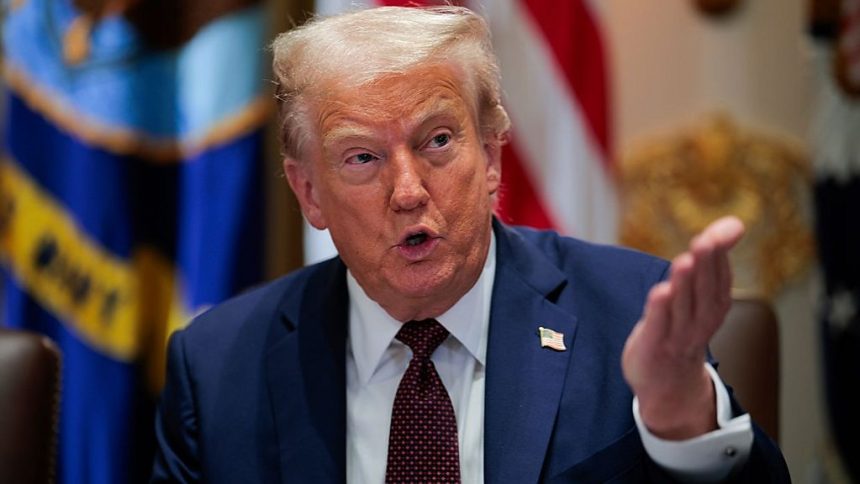In a bold and controversial move, President Donald Trump announced that the U.S. government will pursue the death penalty in murder cases that occur in Washington, D.C. This announcement, made during a cabinet meeting in late August 2025, has ignited nationwide debate about the federal government’s role in capital punishment, local governance, and the future of crime deterrence in the nation’s capital.
The president emphasized that violent crime in Washington, D.C., has reached levels that demand decisive action, suggesting that the death penalty would act as a “very strong preventative” against murder.
The Announcement
President Trump made it clear that his administration plans to seek the death penalty for all murder cases in D.C., a policy shift that would mark a significant federal intervention in the city’s criminal justice system. He argued that enforcing the death penalty would demonstrate a zero-tolerance approach to violent crime and strengthen public confidence in law enforcement.
“This is about protecting lives,” Trump stated. “If somebody kills someone in the capital, Washington, D.C., we’re going to be seeking the death penalty. Justice must be swift and decisive.”
Legal and Political Context
Washington, D.C., has historically opposed the death penalty. The city abolished capital punishment in 1981, and a 1992 referendum reaffirmed the public’s opposition. However, the unique structure of D.C.’s legal system allows federal jurisdiction over certain crimes, including those involving federal officials or murders that occur during the commission of federal offenses.
This legal framework makes it technically possible for the federal government to pursue the death penalty in specific D.C. cases. Yet, implementing such a policy presents formidable challenges. Local juries have historically been reluctant to impose death sentences, reflecting deep-rooted community opposition to capital punishment.
Broader Implications
Trump’s announcement is part of a wider “law and order” agenda, which includes deploying federal resources to address violent crime and, in some cases, federalizing aspects of local law enforcement. While proponents argue that these measures are necessary to curb rising homicide rates, critics warn that such actions could undermine local governance and set a precedent for federal overreach.
Experts note that introducing the death penalty in D.C. could spark legal battles, particularly given the city’s long-standing anti-capital punishment stance. Federal prosecutors would likely face hurdles in securing death sentences, especially when local juries are resistant.
Public Reaction
The announcement has drawn polarized reactions. Supporters see the policy as a strong step toward reducing violent crime and delivering justice to victims. Many argue that capital punishment remains a necessary deterrent, particularly in cities struggling with rising homicide rates.
Opponents, however, view the move as a dangerous encroachment on local authority and highlight concerns about racial and economic disparities in the application of the death penalty. Legal scholars have also raised questions about the constitutionality of imposing death sentences in a jurisdiction that has consistently opposed them.
Historical Context of Capital Punishment in D.C.
Washington, D.C., last executed a person in 1957, long before the city officially abolished the death penalty. Since then, there have been efforts to reinstate it at various points, but voter opposition and political resistance have consistently prevented its return. The current push by the federal government represents the first major effort in decades to reintroduce capital punishment to the city.
The reluctance of local juries is also significant. High-profile cases in the early 2000s involving violent offenders ended with life sentences rather than death, illustrating the challenges federal prosecutors could face in securing a capital verdict.
Crime Trends in Washington, D.C.
Washington, D.C., has experienced fluctuations in violent crime over the past decade. Recent reports indicate that homicides have been steadily increasing, prompting public concern and calls for stronger law enforcement responses. Federal authorities argue that pursuing the death penalty in murder cases could serve as a deterrent and reduce violent crime rates.
However, research on the effectiveness of the death penalty as a deterrent is mixed. Some studies suggest minimal impact on overall crime rates, while others indicate a potential psychological deterrent effect. The debate over efficacy remains a central point in the public discussion surrounding Trump’s announcement.
Legal Challenges Ahead
Implementing the death penalty in D.C. is likely to face several legal obstacles:
Jury Reluctance: Local juries historically avoid imposing death sentences.
Appeals: Any death sentence would almost certainly be subject to lengthy appeals at the federal level.
Constitutional Questions: Critics argue that pursuing capital punishment in a jurisdiction opposed to it could violate principles of local self-governance.
Legal analysts predict that even if the administration moves forward, actual executions may be rare due to these hurdles.
Broader Political Implications
Trump’s decision could reshape federal-local relations. Advocates of federal intervention argue that the federal government has a duty to ensure justice in the capital, particularly for crimes affecting national institutions. Critics counter that such measures erode local control and could politicize the criminal justice system.
The announcement also plays into the broader national debate on the death penalty, which has seen declining support in recent decades. While some states continue to impose capital punishment, others have abolished it entirely, reflecting deep divisions in public opinion.
FAQs
What types of murders in D.C. could be eligible for the death penalty under federal law?
Murders involving federal officials or murders committed during federal crimes are eligible. Certain premeditated homicides may also fall under federal jurisdiction.
Has Washington, D.C., ever executed anyone recently?
The last execution in D.C. occurred in 1957. The city abolished the death penalty in 1981, and a referendum in 1992 reaffirmed opposition.
Why is the death penalty controversial in D.C.?
D.C. residents have historically opposed capital punishment, citing moral, ethical, and racial concerns. Juries often resist imposing death sentences.
How might federal prosecutors handle these cases?
Federal prosecutors could pursue capital charges under federal law, but securing a death sentence would require overcoming jury reluctance and extensive appeals.
What are the broader implications of this policy?
The policy could strain federal-local relations, influence national debates on the death penalty, and test the limits of federal authority in local jurisdictions.
Conclusion
President Trump’s decision to pursue the death penalty in all murder cases in Washington, D.C., represents a bold and controversial federal initiative. It raises fundamental questions about federal authority, local governance, and the morality and effectiveness of capital punishment.
As the policy unfolds, legal challenges are expected, and the reaction from the public and local officials will shape the trajectory of capital punishment in the nation’s capital. This development could serve as a bellwether for future federal involvement in crime prevention and the ongoing debate over the role of the death penalty in American society.














